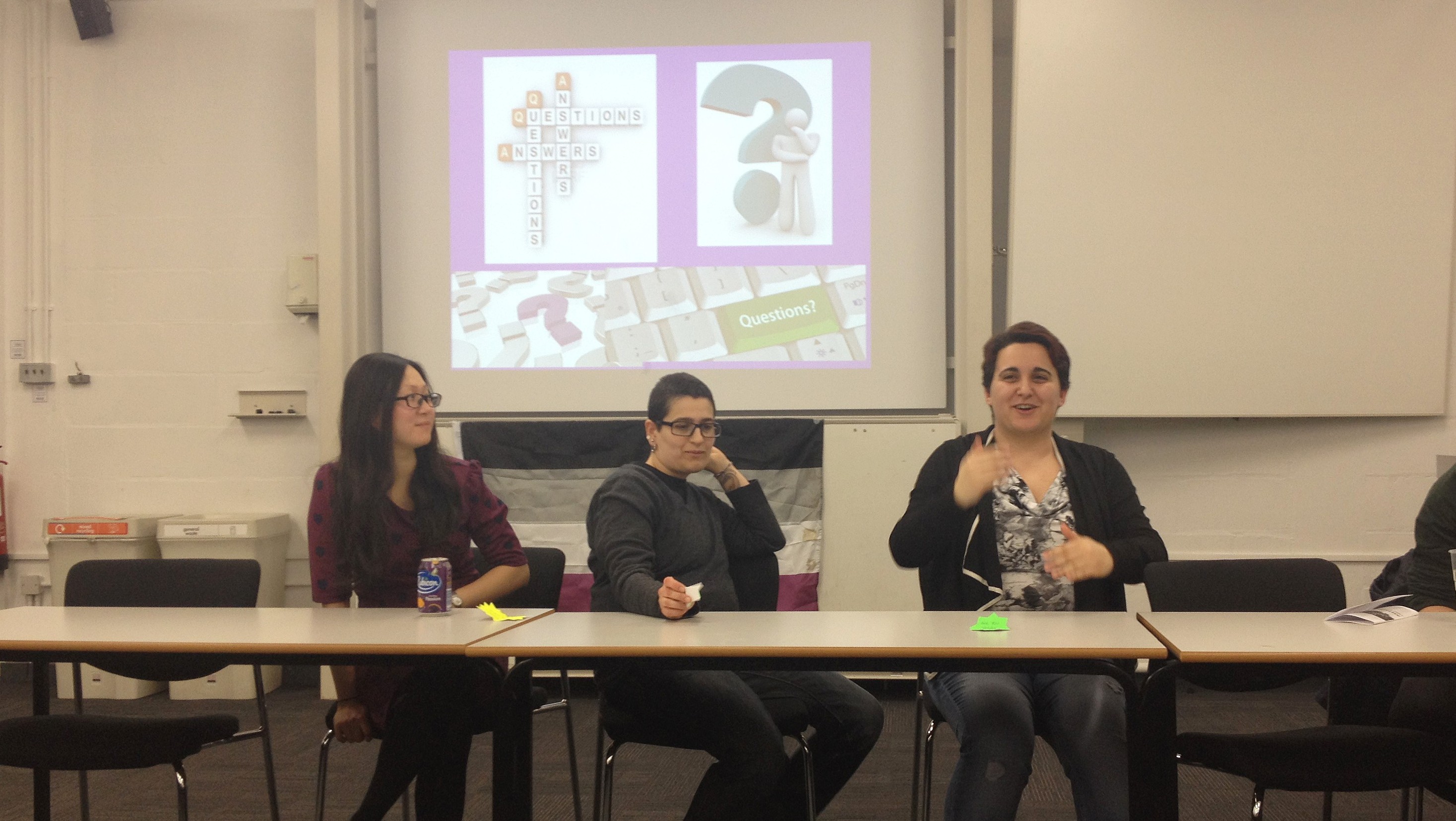Internationally renowned activists taught Kingston University students about asexuality last week, a sexual orientation that is often misunderstood.
Guest speakers and activists Lea Uva, Katie and Diego Maco talked about how their sexual orientation, and how a lack of sexual appetite, affected their lives.
“An asexual person is a person who does not experience sexual attraction to anyone,” Lea Uva told the 30 students who attended the event on March 5.
The speakers told they often hear questions among the lines of “Where you abused as a child?” and “Do you masturbate?” They said the most common reaction is people saying “It’s because you haven’t had sex with me yet”.
Uva said: “People ask you the most intimate questions, which they would never ask anyone else. My advice is to ask the questions back to the person who asked you. Then, they usually get quiet.”
The interactive event started with the guest speakers handing out statements about coming out as an asexual, which the students read out loud.
The workshop, organised by Kingston University LGBT+ Society, was held to disprove misconceptions that people may have to what it means to be asexual.
Common misconceptions are that asexual people live in celibacy or does not want a romantic relationship.
Uva said: “Asexual people may want to have a romantic relationship, they just don’t feel the urge to be intimate. As you understand, this can be quite hard if you fall in love with a person who wants to be intimate.”
The asexual community’s slogans are “cake is better than sex” and “asexy and I know it”.
A 2004-study by sexologist and psychologist Anthony Bogaert suggested that one per cent of the British population are asexual.
In Bogaert’s study titled Asexuality: Its Prevalence and Associated Factors in a National Probability Sample, he concluded that one in a hundred Brits have a low or absent interest in sexual activity.
Bogaert said asexuality is still often considered a disorder: “In the medical community, many people have just assumed that all asexuals can be diagnosed with a sexual disorder, most commonly Hypoactive Sexual Desire Disorder. It’s very problematic.”
Uva explained that coming out as an asexual can be quite difficult, as it is often confused with a mental disorder. She said that some doctors hand out medication and offer therapy to those who question their lack of sex drive.
Uva, who is from Italy, has spoken at both of the WorldPride Asexual Conferences held so far, and the LGBT+ Society said they felt privileged to have her on board.
“It’s a big deal for the university to have her on board,” secretary of Kingston University LGBT+ Society, Laura Saunders said.

The activists questioned whether it is actually worth letting your parents know you are asexual, as Uva said: “Your parents don’t want to know what you do in the bedroom anyway.
“At the end of the day, all your family wants to know if whether or not you will give them grandchildren. So, in reality, all you need to tell your parents is whether you like girls or boys.”
Uva and Maco who are both from Italy explained it was hard to ‘come out’ in a Catholic country where “a woman’s role in life is to please a man”.
Uva said her parents sent her off to doctors and gynaecologists to have her hormones checked when she came out as an asexual.
After the talk, the students had lots of questions for the speakers, especially concerning labels.
Diego Maco, who is born a female, but prefers to be identified as “they” or “him”, said labels such as gay, lesbian, bisexual and asexual were important in order to feel affiliation to a community and to be recognised as a minority.
However, he added that no one should feel “limited” to their specific label.
He said: “Labels are important for your identity, but you should not be defined by your label and feel like you have to act in a specific way.”
Uva, who learnt she was asexual at the age of 24 after having dated “several men”, stressed that it is important to find out where you stand on the heterosexual/homosexual spectrum, also called the Kinsey Scale.
She said: “If you don’t have a word for what you are, imagine how that make you feel. It makes you feel confused and alone.”
The guest speakers gave tips on how to approach a situation of a friend ‘coming out’ as an asexual.
Their advice was to not ask “stupid, intimate questions”, but rather to research the subject online and let their friend know they get support.
Psychology student and organiser of the event, Laura Saunders, said the LGBT+ Society wanted to learn more about the sexual orientation as they aim to include the “+” within the community.
She said: “Asexuality is often forgotten in society and not a topic mentioned in day-to-day life. Sadly even within the LGBT+ community asexuality is often misunderstood or not talked about.”
Saunders said events like these are important at university as some students may identify with being asexual: “Some students may not be aware themselves with how to apply the feelings they are having, and those that know may feel that others aren’t aware of what it means to be asexual.”
She added: “Although many people think asexuality is just the lack of sexual attraction to anybody, it is not that black and white. In fact there are many different traits of one who is asexual, those of which are different from one person to the next.”


Asexuality and homosexuality in my mind is very similar, but with a different label.
Sounds like you really needed to attend this talk.
a fantastic role model for asexuality. as an ace myself, i think this young lady is a wonderful example of how to spread the word of being asexual and how it is like to be asexual in day-to-day life! just wonderful!